April 20, 2018 - When Kenny Huynh learned he was a recipient of a National Science Foundation Graduate Research Fellowship, the overjoyed materials engineering student, who will graduate in June, excitedly called the person who had helped him complete his application. It was UC LEADS (Leadership Excellence through Advanced DegreeS) coordinator Daniel Fabrega. “I put a lot of work into this, so [he] was the first person I called,” Huynh said, “before my own parents.”
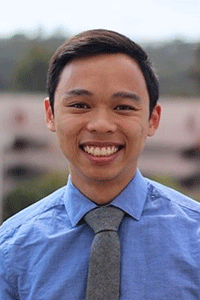 Huynh was one of six Samueli School graduate students and soon-to-be graduate students – and 26 UC Irvine students – to win the coveted fellowship this year from a field of 12,000 applicants. Each of the 2,000 fellowship winners nationwide will receive annual stipends of $46,000 for three years to help finance their graduate studies.
Huynh was one of six Samueli School graduate students and soon-to-be graduate students – and 26 UC Irvine students – to win the coveted fellowship this year from a field of 12,000 applicants. Each of the 2,000 fellowship winners nationwide will receive annual stipends of $46,000 for three years to help finance their graduate studies.
The Graduate Research Fellowship Program, launched in 1952 soon after Congress established the NSF, supports high-potential, early career scientists and engineers in graduate school. It is the nation’s oldest continuous investment in the U.S. STEM workforce.
Huynh, whose adviser is mechanical and aerospace engineering Assistant Professor Jaeho Lee, works to characterize the thermal properties of individual silicon nanowires, research that has applications in thermoelectricity – generating electricity from waste heat.
There were four biomedical engineering recipients this year, the largest number ever, according to department chair Abe Lee.
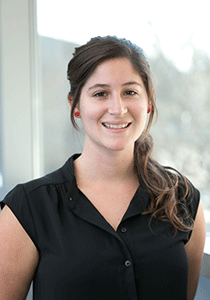
Other Samueli School winners include:
Sarah Maxel, chemical engineering. Maxel works with adviser Han Li, chemical engineering and materials science assistant professor, to engineer biological cells that can convert renewable resources to useful chemicals like fuels, industrial commodities and pharmaceutical compounds. She uses synthetic biology
and protein engineering to construct unnatural metabolic pathways that can help solve a range of metabolic engineering problems.
Maxel first read her award announcement after waking up in the middle of the night; “I was pretty sure I was dreaming,” she said. A congratulatory email from UCI the next morning convinced her the award was real. “I was honored to be selected, thankful to my professors for their support and generally pretty ecstatic all day.”
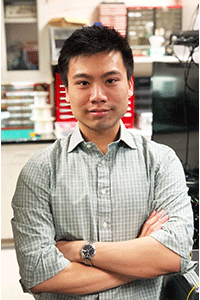 Jason Chen is advised by biomedical engineering Professor Zhongping Chen (no relation). Chen is working to develop ex vivo and in vivo optical coherence tomography systems to study the structural and functional relationship of the body’s mucociliary apparatus - the self-clearing mechanism of the bronchi and an essential piece of the upper respiratory tract’s defense mechanism. These tomography systems could measure all of the parameters of the mucociliary apparatus simultaneously without disturbing mucociliary transport, leading to advances in understanding a broad spectrum of respiratory diseases.
Jason Chen is advised by biomedical engineering Professor Zhongping Chen (no relation). Chen is working to develop ex vivo and in vivo optical coherence tomography systems to study the structural and functional relationship of the body’s mucociliary apparatus - the self-clearing mechanism of the bronchi and an essential piece of the upper respiratory tract’s defense mechanism. These tomography systems could measure all of the parameters of the mucociliary apparatus simultaneously without disturbing mucociliary transport, leading to advances in understanding a broad spectrum of respiratory diseases.
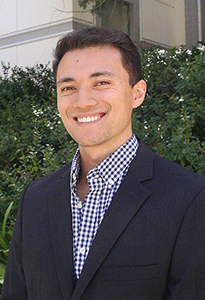
Austin Lefebvre, biomedical engineering, seeks to understand why certain tumors are more invasive than others. With adviser Michelle Digman, biomedical engineering assistant professor, Lefebvre uses advanced imaging techniques to investigate the metabolic and physical characteristics of 3-D breast cancer tumor clusters in aggressive and non-aggressive cell types. He hopes to model how this invasiveness functions and why some cells in the clusters lead the process, potentially developing therapeutics to stop tumor invasion.
“To be placed in a group of such amazing scientists who are conducting meaningful and impactful research was both an honor and a humbling experience,” Lefebvre said. “I know none of this could have been possible without the help of my amazing research advisers and mentors, and of course, the support of my family.”
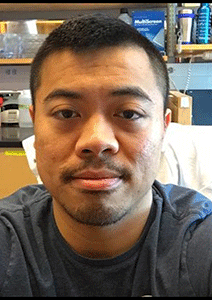
Biomedical engineering student Tam Vu works on the development of a rapid and ultrasensitive diagnostic test that can identify antibiotic-resistant pathogens from a small blood sample. Under the guidance of adviser Weian Zhao, associate professor of pharmaceutical sciences, Vu is developing a cheaper, faster and more sensitive test for earlier treatment and prevention of sepsis by partitioning a blood sample into millions of droplets and then screening the droplets for the presence of specific bacterial genes.
Vu was “ecstatic” when he learned that he had won the fellowship. “I am very grateful to everyone who has helped me earn this fellowship, and I will work hard to make the most out of this opportunity,” he said.
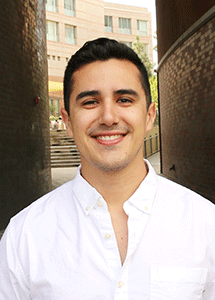
Erik Alexander Gonzalez-Leon, biomedical engineering, uses self-assembling methods to tissue engineer the meniscus, the thin fibrous cartilage between the surfaces of joints. Under the direction of his research adviser, Distinguished Professor Kyriacos Athanasiou, he adds biochemical and mechanical stimuli during tissue culturing to enhance the mechanical properties of the meniscus, bringing it closer to native tissue. Ultimately, he hopes to tissue engineer meniscus constructs that can be used in translational in-vivo studies.
Gonzalez-Leon said he was ecstatic to learn that he was a GRFP recipient. “As a first-generation Latino student, it is an honor to be able to set an example for students in this demographic who wish to pursue higher education. This could not have been possible without wonderful mentors, and ultimately I owe it to them and my fellow lab mates in the Athanasiou group,” he added.
- Anna Lynn Spitzer
